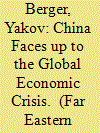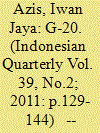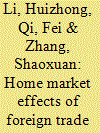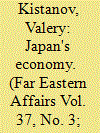|
|
|
Sort Order |
|
|
|
Items / Page
|
|
|
|
|
|
|
| Srl | Item |
| 1 |
ID:
087648


|
|
|
|
|
| Publication |
2009.
|
| Summary/Abstract |
China's growing involvement in the global economy and politics brings it considerable benefits. China gets unrestricted access to world markets for goods and services to supply to, to natural resources and fuels, new technologies and modern managerial know-how, and to international organizations that adopt decisions critical to China's development. All these benefits are acquired at the cost of the country's rising dependence on worldwide developments, market ups and downs, and even worldwide cataclysms.1 The current global financial and economic crisis shows this beyond a shadow of doubt. Accordingly, debates are erupting now and then in China about the balance of gain and loss; about the best way to use the advantages of being involved in globalization and to avoid its most destructive consequences; and also about what is needed to maintain the country's economic and political sovereignty and security without fencing itself off from the rest of the world, but instead take the position of a responsible participant and agent of world history.
Crises in the free-market economy that China is determined to build are certainly unavoidable. The key issue is then to realize that the market, the principal advantages of which are higher competitiveness of enterprises, the state itself, and individuals, cannot correct its inevitable deficiencies all by itself. While promoting a free-market economy, therefore, China is seeking to keep very power-
|
|
|
|
|
|
|
|
|
|
|
|
|
|
|
|
| 2 |
ID:
167434


|
|
|
|
|
| Summary/Abstract |
Why do citizens support violations of their own rights? We know a good deal about why governments sometimes restrict access to information and political participation through censorship, repression, or forced disappearances. But we know little about why citizens sometimes support these government encroachments on their own freedoms. We test one conventional explanation for this phenomenon—that individuals trade freedom for security—by conducting a survey experiment that examines public support for limits on freedom of speech. Our results suggest that external threats do, in fact, increase the willingness of citizens to accept curtailments of their right to free speech. They provide strong evidence that citizens respond to risk with an increased desire for security, even when that security comes at the expense of their individual freedoms. This finding suggests a research agenda examining the interactions between governance and threat perception, including how states manipulate demand for human rights in practice, how citizens evaluate threats to security in the context of conflicting information, and how fluctuating demand for rights influences the dissent-repression nexus.
|
|
|
|
|
|
|
|
|
|
|
|
|
|
|
|
| 3 |
ID:
111774


|
|
|
| 4 |
ID:
113678


|
|
|
|
|
| Publication |
2012.
|
| Summary/Abstract |
In this paper, we use 2002-2008 International Standard Industry Classification two-digit bilateral trade panel data for manufacturing industries in China and the OECD countries to test for the existence of home market effects. We find that significant home market effects exist in 8 out of 12 industries. These industries include the food, beverage and tobacco industry, wood products, the paper products and printing industry, chemical products, other non-metallic mineral products, machinery and equipment, transport equipment, and miscellaneous products and waste resources recycling industry. Textile, clothing and leather manufacturing, oil refining and nuclear fuel manufacturing, rubber and plastics, and basic metals and fabricated metal products industries do not exhibit home market effects. Indeed, strong reverse home market effects occur for oil refining and nuclear fuel manufacturing and for the rubber and plastics industry. The empirical results reveal that certain industries benefit from new export opportunities due to the expansion of domestic demand in China.
|
|
|
|
|
|
|
|
|
|
|
|
|
|
|
|
| 5 |
ID:
091778


|
|
|
|
|
| Publication |
2009.
|
| Summary/Abstract |
The world financial crisis has struck Japan's economy more heavily than the economies of other countries. In order to emerge from the crisis the Japanese government put an emphasis on the Keynesian methods of regulation, which consist in pumping state financial means into the economy with a view to expanding domestic demand and eliminating disbalance between demand and supply.
|
|
|
|
|
|
|
|
|
|
|
|
|
|
|
|
| 6 |
ID:
092144


|
|
|
|
|
| Publication |
2009.
|
| Summary/Abstract |
After the prolonged stagnation that followed the post-Bubble economic collapse at the end of the 1980s, from 2002 onwards the Japanese economy exhibited its longest period of economic expansion (albeit gradual) since World War Two. As this expansion came to an end and the economy was on the verge of the downward curve of the economic cycle, it was confronted with the current financial and economic crises, which originated in the USA. Nevertheless, Japanese financial institutions had invested little in sub-prime-related financial products, and with the lessons learned from the issue of bad loans in the 1990s, Japan's financial system enjoyed greater stability than that of any other major nation. However, in the period from the end of 2008 to early 2009, Japan experienced the sharpest economic decline of any major nation.
Yet, with the worst period having ended in the spring of 2009, the International Monetary Fund (IMF) has predicted in its October 2009 forecasts that Japan will experience real economic growth of 1.7% in 2010-a higher rate than the USA (with 1.5%) or the Euro Zone (with 0.3%). Despite forecasts of a protraction of excessive US imports as a direct result of excessive US consumption, Japan is being forced to reduce its degree of reliance on exports to the USA and to make major adjustments to its export structure-both in terms of the regions to which it exports and the products that it exports. Japan also faces the task of setting itself on the path to economic growth, using the twin drivers of foreign demand and domestic demand, and this will necessitate the cultivation of domestic demand. Now, the long-term strategy for Japan is to promote the expansion of regional demand in Asia, to couple this regional demand with domestic demand, and to latch on to Asia's economic dynamism.
|
|
|
|
|
|
|
|
|
|
|
|
|
|
|
|
|
|
|
|
|